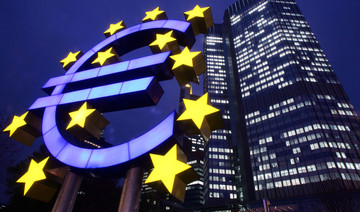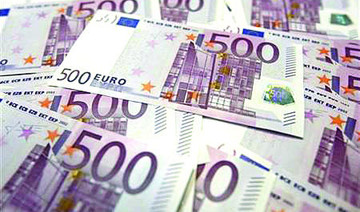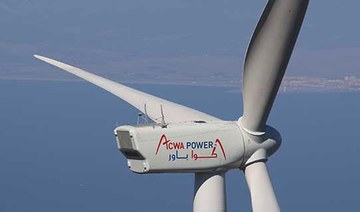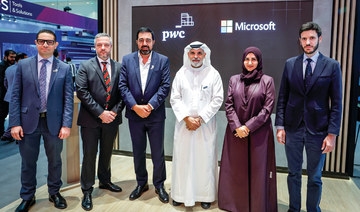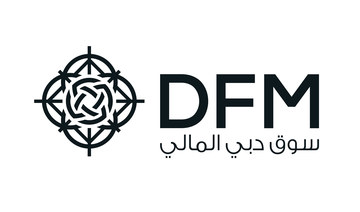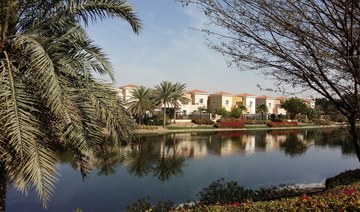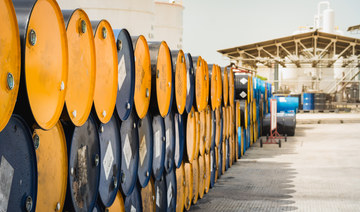FRANKFURT AM MAIN: As the ECB takes the final step in phasing out the €500 note, few are expected to mourn a bill favored by criminals but rarely seen in daily life.
Except perhaps in cash-loving Germany.
From Sunday, central banks in 17 of the 19 eurozone countries will stop issuing the violet-colored banknotes.
Only the German and Austrian central banks are clinging on a while longer, until April 26, to “ensure a smooth transition,” the European Central Bank said in a statement.
Medical technician Rolf, from the German town of Marburg, said he found the demise of the single currency’s highest-denomination note “hard to accept.”
Standing a stone’s throw from Frankfurt’s blue-and-yellow euro sculpture after a meeting in the city, the 61-year-old said he had made a point of paying for his car in €500s.
“I prefer using cash for large payments, it doesn’t mean I’m involved in anything dodgy,” Rolf said, declining to give his last name.
The ECB decision to end the note’s issuance will lead to fewer and fewer circulating as commercial banks gradually return them to their countries’ central banks, where they will be replaced by lower-denomination bills.
But anyone hoarding €500s under their mattress needn’t worry, as all existing bills remain legal tender.
“They can continue to be used to spend or to save, and they will always retain their value,” said ECB spokeswoman Eva Taylor.
The €500 bill accounted for just 2.3 percent of all euro notes in circulation last month.
The banknote’s death warrant was signed in 2016 when the ECB formally ended its production over concerns it could “facilitate illegal activities” after research linked its use to money laundering, tax evasion and terrorism financing.
Sometimes dubbed the “Bin Laden,” the note has proved a compact way to transport illicit money.
A million euros in €500 notes weighs just 2.2 kilogram, fitting easily into a laptop bag.
The same sum in $100 bills, the US currency’s highest denomination, would weigh almost six times as much and require a much larger case.
While the plan to slowly kill off the €500 made few waves abroad, it sparked an emotional debate in Germany where many feared it was a prelude to abolishing cash altogether.
Among the fiercest opponents was Jens Weidmann, chief of Germany’s powerful Bundesbank central bank, who said scrapping the note would do little to combat crime but could “damage trust” in the single currency.
Critics also said the move would make it more difficult and expensive for banks to physically store large amounts of cash in order to bypass negative interest rates.
The ECB’s deposit rate currently stands at minus 0.4 percent, meaning banks pay to park excess funds with the Frankfurt institution.
When the euro was created two decades ago, Germany was keen to have a €500 bill as the closest equivalent to its cherished 1,000-Deutsche Mark banknote.
But even in Europe’s top economy, where privacy is prized and cash is king, the €500 isn’t any more widely used than in other countries, and won’t be universally missed.
Suzanne Spenner, a Frankfurt-based nanny in her mid-fifties, said in her experience the slightly oversized note — an awkward fit in most wallets — was a pain to get rid of.
“They wouldn’t take it in the shops. I have no need for it.”
A 2017 Bundesbank study found that over 60 percent of Germans have dealt with the €500 note at least once, often as a gift, a way of storing money or to pay for large purchases.
Across the euro region, the ECB said “more people than often thought use high denomination banknotes.”
In a major 2015-2016 ECB survey, almost 20 percent of eurozone respondents said they had handled a €200 or €500 bill in the preceding year.
Lucia Bassing, owner of a high-end store selling beds and mattresses in Frankfurt, said while card payments were on the rise, it wasn’t unusual for customers to pay for a €3,000 bed in €500s.
“I personally don’t like carrying a €500 note on me so I won’t miss it,” said the 49-year-old.
“But I’m always happy to accept them from customers,” she laughed.
Mixed emotions in Germany as €500 note bows out
Mixed emotions in Germany as €500 note bows out
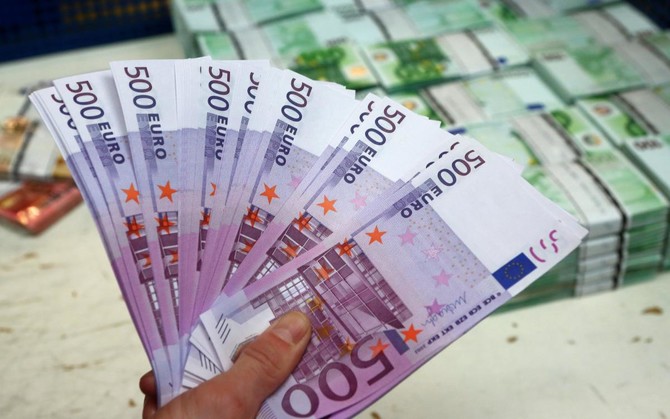
- From Sunday, central banks in 17 of the 19 eurozone countries will stop issuing the violet-colored banknotes
- The €500 bill accounted for just 2.3 percent of all euro notes in circulation last month
ACWA Power secures landmark $80m bridge loan from Bank of China for Uzbekistan projects
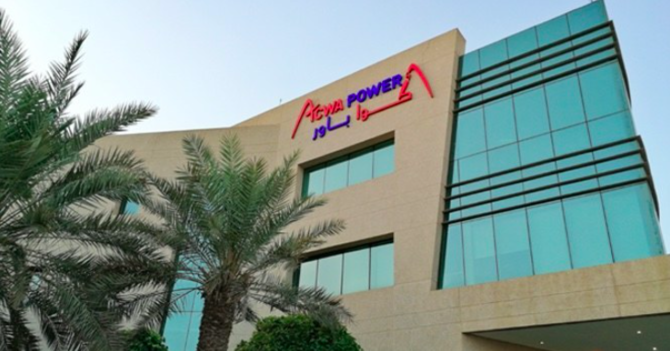
RIYADH: Saudi energy giant ACWA Power has secured an $80 million equity bridge loan from the Bank of China for its Uzbekistan initiatives.
According to an official press release, the payment is split equally between Chinese yuan and US dollars, marking the first loan cooperation deal by a bank from the Asian country using its native currency involving a company from the Kingdom.
ACWA Power said the fund will boost its Tashkent 200 megawatts solar photovoltaic power plant and 500 MW per hour battery energy storage system project in Uzbekistan.
“This transaction culminated the initial agreement reached during the 3rd BRF (Belt and Road Forum) summit in October 2023, where ACWA Power was represented by its chairman as a keynote speaker,” the company said in a statement.
ACWA Power’s Chief Financial Officer, Abdulhameed Al-Muhaidib, highlighted the significance of this milestone, citing its alignment with Saudi Arabia’s Vision 2030 and China’s Belt and Road initiative.
He said: “We are delighted to deepen our cooperation with Bank of China to bring renewable energy at competitive tariffs to our key markets, including Uzbekistan.”
ACWA Power has a longstanding relationship with Chinese entities, dating back over 15 years, with investments from the Asian country in the company’s projects exceeding $10 billion.
The General Manager of the Bank of China, Pan Xinyuan, said: “I believe that the Belt and Road Initiative is in harmony with Saudi Arabia’s Vision 2030. Bank of China will further leverage its strengths to support the cooperation between Saudi enterprises like ACWA Power and their Chinese partners for win-win objectives.”
He added: “Looking ahead, Bank of China will continue to improve financial connectivity to push the Belt and Road economies on a track of sustainable and high-quality development.”
ACWA Power has been collaborating with multiple countries to develop its plants.
Earlier this month, the company signed a $800 million agreement with Senegal’s Ministry of Water to develop a desalination facility.
It announced the inking of a water purchase agreement for the construction of the facility in Dakar, Senegal in a statement on the Saudi stock exchange, Tadawul.
ACWA Power will be responsible for the infrastructure, design and financing as well as construction, operation and maintenance of the Grande Cote seawater desalination plant in the West African country.
Microsoft to invest $1.5bn in UAE-based AI firm G42
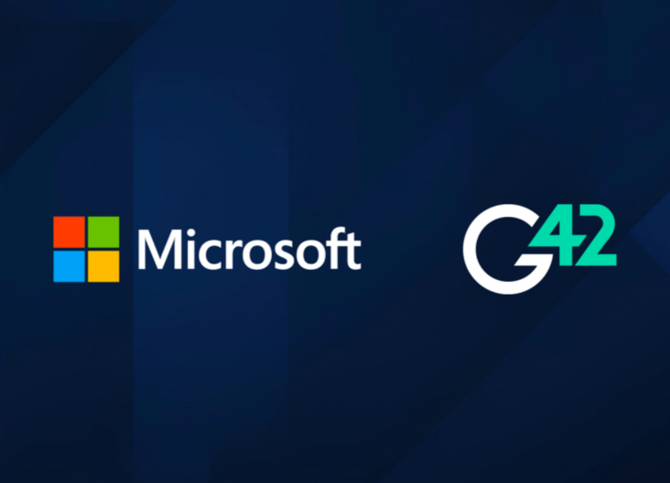
RIYADH: Global tech giant Microsoft will invest $1.5 billion in the UAE-based artificial intelligence technology company G42, aiming to offer the latest AI solutions and skilling initiatives.
As part of the deal, G42 will grant the US firm a minority stake and Brad Smith, Microsoft’s vice chair and president, will join the Emirati firm’s board of directors, according to a press release.
Smith said: “Our two companies will work together not only in the UAE, but to bring AI and digital infrastructure and services to underserved nations.”
He added: “We will combine world-class technology with world-leading standards for safe, trusted, and responsible AI, in close coordination with the governments of both the UAE and the United States.”
The deal will see G42 utilizing Microsoft Azure to run its AI applications and services, partnering to deliver advanced solutions to global public sector clients and large enterprises.
Moreover, the companies will collaborate to bring advanced AI and digital infrastructure to nations in the Middle East, Central Asia, and Africa, ensuring equitable access to services, the release added.
“Microsoft’s investment in G42 marks a pivotal moment in our company’s journey of growth and innovation, signifying a strategic alignment of vision and execution between the two organizations,” said Tahnoon bin Zayed Al-Nahyan, chairman of G42.
“This partnership is a testament to the shared values and aspirations for progress, fostering greater cooperation and synergy globally,” he added.
The agreement also encompasses a $1 billion investment in a fund for developers, which aims to bolster the creation of a skilled and diverse AI workforce, as well as foster innovation and competitiveness for the UAE and the broader region.
UAE grocery store chain Spinneys to float 25% stake on Dubai Financial Market
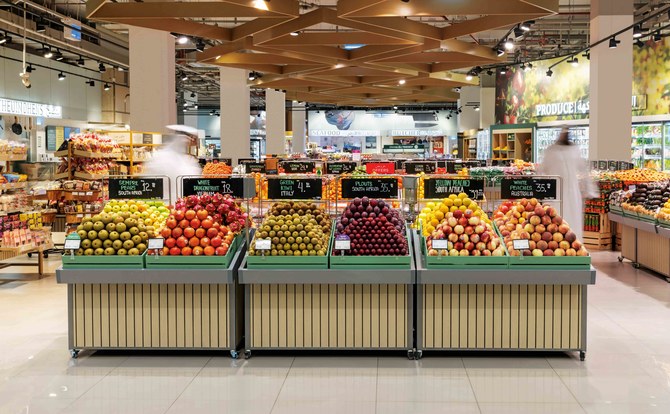
RIYADH: UAE-based grocery store operator Spinneys 1961 Holding PLC has announced its intention to proceed with an initial public offering on the Dubai Financial Market.
Al Seer Group, Spinney’s parent company and the selling shareholder, expects to sell 25 percent of the total issued share capital of the firm, equivalent to a total of 900 million shares.
The IPO’s subscription period will begin on April 23 and the DFM listing is set for May 9, the company said in a release.
The offering will be made available to UAE retail investors with 5 percent or 45 million shares in the first tranche, while the second tranche will provide professional stakeholders with 855 million shares.
Dubai’s high-end property sales rise on overseas demand
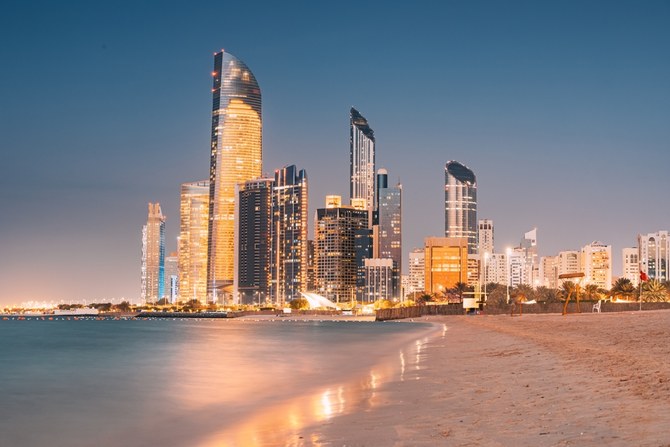
DUBAI: Sales of homes in Dubai worth $10 million or more rose 6 percent in the first quarter versus last year, an industry report showed on Tuesday, as demand from the international ultra-rich for homes in the emirate showed little sign of abating, according to Reuters.
A total of 105 homes worth an overall $1.73 billion were sold from January to March, up from around $1.6 billion a year earlier, according to property consultancy Knight Frank.
Activity was dominated by cash buyers, with palm tree-shaped artificial island Palm Jumeirah the most sought-after area, accounting for 36.3 percent of sales by total value, followed by Jumeirah Bay Island and Dubai Hills Estate.
Home to the world’s tallest tower, the UAE’s Dubai is seeking to grow its economy through tourism, building a local financial center and by attracting foreign capital, including into property.
The recent property boom has shown signs of fizzling out, however, with developers, investors and brokers worrying whether a painful correction akin to the slump that rocked the emirate in 2008 can be avoided.
Last year, Dubai ranked first globally for number of home sales above $10 million, selling nearly 80 percent more such properties than second-placed London, according to Knight Frank.
The city also bucked the trend of falling luxury prices seen in cities like London and New York last year, posting double-digit gains, Knight Frank said in February.
“The level of deal activity in Dubai continues to strengthen, particularly at the top end of the market, where the near constant stream of international high-net-worth-individuals vying for the city’s most expensive homes persists,” said Faisal Durrani, Knight Frank’s head of research for Middle East and Africa.
Durrani told Reuters Dubai was aided by the relative affordability of its luxury homes, where well-heeled buyers can purchase about 980 sq. feet of residential space for $1 million, “about three or four times more than you would get in most major global gateway cities.”
The strong demand suggests many international investors are acquiring Dubai property for second homes rather than “constant buying to flip,” he said, referring to the past practice of buying in order to sell to others quickly for more money.
Oil Update — prices rise on China growth, Middle East tensions
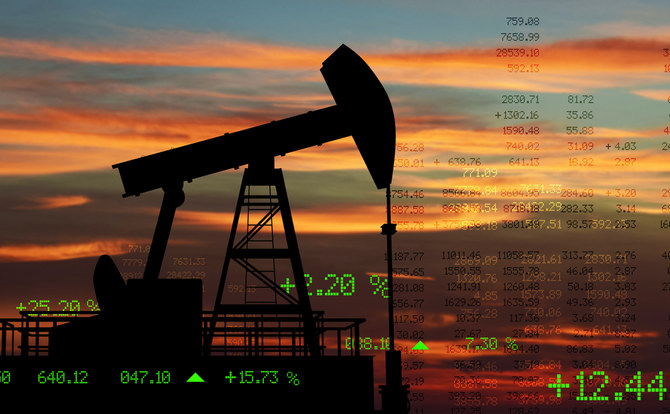
SINGAPORE: Oil prices rose on Tuesday after data showed China's economy grew faster than expected, while heightened tensions in the Middle East also kept markets on edge after Israel said it would respond to Iran’s weekend missile and drone attack, according to Reuters.
Brent futures for June delivery rose 20 cents, or 0.2 percent, to $90.30 a barrel by 10:57 a.m. Saudi time. US crude futures for May delivery rose 21 cents, or 0.3 percent, to $85.62 a barrel.
Earlier in the day oil prices had risen nearly 1 percent following the release of official data from China showing gross domestic product in the world’s biggest oil importer grew 5.3 percent in the first quarter, year-on-year, comfortably beating analysts’ expectations.
However, both benchmarks pared some gains as a raft of other Chinese indicators including real estate investment, retail sales and industrial output showed demand remained weak in the face of a protracted property crisis.
Oil prices soared last week to the highest levels since October, but fell on Monday after Iran’s weekend attack on Israel proved to be less damaging than anticipated, easing concerns of a quickly intensifying conflict that could displace crude barrels.
“Israel’s response will determine whether the escalation ends or continues. The conflict could still be contained to Israel, Iran and its proxies, with possible involvement of the US,” analysts at ANZ Research said in a note on Tuesday.
Israel’s Prime Minister Benjamin Netanyahu on Monday summoned his war cabinet for the second time in less than 24 hours to weigh how to react to Iran’s first-ever direct attack on Israel.
Iran produces more than 3 million barrels per day of crude oil as a major producer within the Organization of the Petroleum Exporting Countries.


